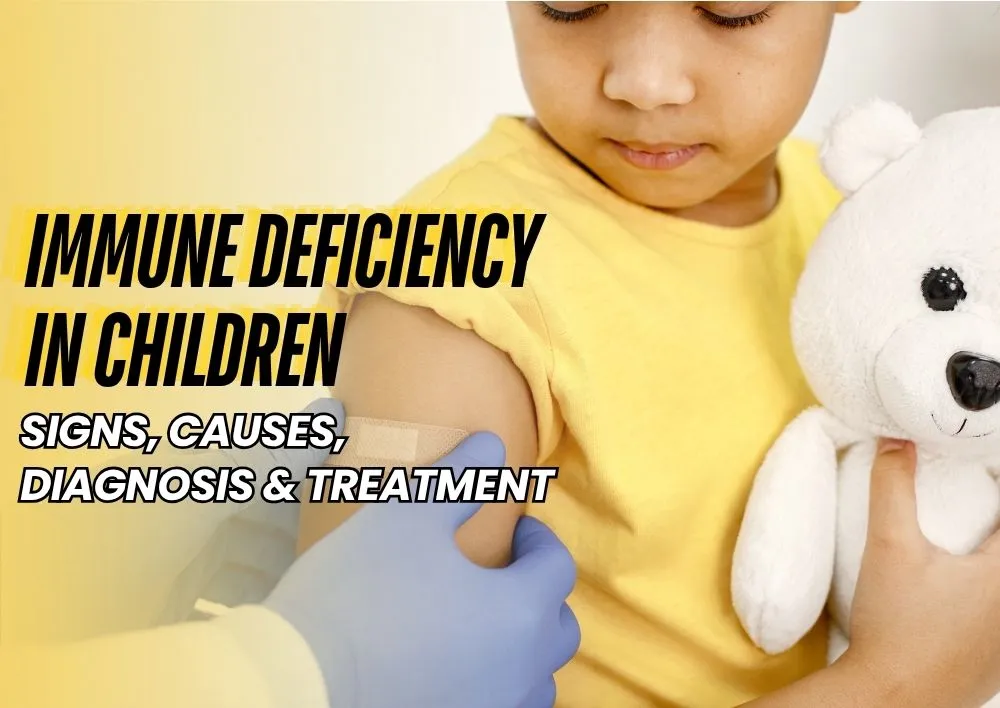Immune Deficiency in Children: Signs, Causes, Diagnosis & Treatment
Summary: Immune deficiency in children occurs when the immune system is unable to protect the body effectively against infections. It can be caused by inherited genetic conditions (primary immunodeficiency) or external factors such as malnutrition, chronic diseases, or prolonged use of certain medications (secondary immunodeficiency). Key signs of immune deficiency include frequent infections like colds, ear infections, or pneumonia; slow or incomplete recovery; unusual or persistent infections; and poor weight gain or delayed growth. Identifying these symptoms early and understanding the underlying causes can help in timely diagnosis and proper treatment.
Overview:
Is your child falling sick again and again? Does your little one take a long time to recover from a simple cold or cough? If your answer is yes, it may be more than just seasonal illness or low immunity. Your child could be showing early signs of immune deficiency, a condition where the body's defense system is not strong enough to fight infections.
In this blog, we will discuss immune deficiency in children, how to recognize the signs, and when to seek medical advice. Early detection is important because timely treatment can help your child lead a healthy and active life.
What is Immunodeficiency?
Our immune system protects the body from harmful germs like viruses, bacteria, and fungi. If this system doesn’t work properly, the body becomes more vulnerable to infections. When this happens repeatedly, it is called immune deficiency.
There are two main types:
-
Primary Immune Deficiency (PID): A group of rare, inherited disorders present from birth.
-
Secondary Immune Deficiency: Caused by other factors like malnutrition, certain medications, chronic diseases, or infections.
Dr. Rahul Aggarwal, Senior Pediatrician in Gurgaon at Miracles Mediclinic, explains: “While every child catches a cold or fever now and then, if these illnesses are too frequent or severe, it is a red flag. Parents should not wait too long to seek medical advice.”
Common Signs and Symptoms of Immune Deficiency in Children
While all children fall ill occasionally, immune deficiency usually presents a pattern of illness that is more frequent, severe, and harder to treat than usual. Here are the most common signs of pediatric immune deficiency to look out for:
1. Frequent Infections
Children with a healthy immune system generally recover from infections with ease. But if your child is experiencing frequent illnesses, it could be a cause for concern. Here are some concerns:
-
Having more than eight episodes of colds, throat infections, or ear infections in one year
-
Suffering from two or more serious infections such as pneumonia, bronchitis, or severe sinusitis in a year
-
Infections that come back quickly even after completing a full course of antibiotics
-
Such repeated illnesses may mean your child's immune system is struggling to fight off common bacteria or viruses effectively.
2. Slow or Incomplete Recovery
If your child takes much longer than usual to recover from routine infections like the flu or a sore throat, it may be a sign of a weak immune response. Sometimes, a child may appear to get better temporarily but then quickly fall ill again with the same symptoms. A proper recovery should be steady and complete. Delayed healing or repeated relapses may cause your child’s body to show signs of an immune deficiency.
3. Severe Infections
While most children can handle minor infections at home, a child with a weak immune system may need hospital care for illnesses that are generally considered mild. If your child frequently requires intravenous antibiotics, emergency treatment, or long hospital stays for infections like diarrhea, skin boils, or high fevers, it may be a sign that their immune system is not functioning properly.
Children with immune issues often face complications even from simple infections, making early diagnosis important.
4. Unusual or Continuous Infections
Some children may experience infections that are not common or are more difficult to treat. This includes:
-
Fungal infections like thrush in the mouth that does not go away easily
-
Ongoing viral infections such as cold sores, warts, or hand-foot-and-mouth disease
-
Rare bacterial infections or those affecting unusual areas of the body
These types of infections usually don’t respond to standard medications and may keep recurring, which can be a warning sign of an immune disorder.
5. Poor Weight Gain or Delayed Development
When a child’s body is continually fighting infections, it can affect their overall development. Children with immune deficiency may not gain weight or grow in height as expected, even if they have a good appetite. This is because their body’s energy is directed toward fighting infections rather than supporting growth.
You might notice:
-
Your child is much shorter or lighter compared to others their age
-
They appear tired, pale, or less active
-
They are not meeting expected developmental milestones on time
-
If your child is usually sick and not growing properly, a medical evaluation is important.
6. Family History of Immunodeficiency Disorders
Genetics can play a major role in immune health. If someone in your family, such as a sibling, parent, or close relative, has been diagnosed with an immune disorder or experienced frequent infections, your child could be at higher risk of having a similar condition. Inherited immune deficiencies are not uncommon, and early screening can help manage the condition before it becomes more serious.
How Is Immune Deficiency Diagnosed in Children?
The diagnosis of immune deficiency may include the following:
-
Complete blood count to check immune cells
-
Immunoglobulin test to see if your child’s body is producing enough antibodies
-
Genetic testing, especially if family history is involved
-
Chest X-rays or imaging if repeated pneumonia is suspected
-
These tests help identify what part of the immune system is not working correctly.
Treatment Options for Children with Immune Deficiency
Treatment depends on the severity and type of immune deficiency. It may include:
-
Regular use of antibiotics to prevent infections
-
Immunoglobulin therapy (IVIG) to provide the body with essential antibodies
-
Bone marrow transplant in severe cases
-
Dietary supplements and immune-boosting nutrients
-
Lifestyle changes to reduce exposure to infections
-
With proper care and monitoring, many children with immune deficiency live normal, active lives.
Tips to Boost Your Child’s Immunity
-
Maintain a balanced and nutritious diet
-
Keep your child up to date with vaccinations (as per doctor’s advice)
-
Ensure good handwashing habits
-
Keep your child away from sick people
-
Give them enough sleep and physical activity
When Should You Consult a Doctor?
You should consult a pediatrician if your child shows any two or more of the above signs regularly. Your doctor may recommend simple blood tests to check the white blood cell count, immunoglobulin levels, and overall immune function.
Dr. Rahul Aggarwal advises: “Don’t wait for things to get worse. If your child is frequently ill or has poor growth, early consultation can make a huge difference in their health outcomes.”
Conclusion:
Immune deficiency in children is a serious but manageable condition if diagnosed early. Do not ignore the signs like frequent infections, poor weight gain, or recurring digestive problems. These could be your child’s way of telling you something is wrong with their immune system.
If you have concerns about your child’s health, consult a pediatrician near you at Miracles Healthcare for personalized care, and long-term support for children with immune system issues.
Frequently Asked Questions
The most common is Selective IgA Deficiency, where the body doesn’t produce enough Immunoglobulin A, making children prone to infections.
If your child has frequent, severe, or unusual infections and takes longer to recover, it could be a sign of immune deficiency.
These are conditions where a child’s immune system is weakened, making them more vulnerable to infections and slower recovery.
A CBC (Complete Blood Count) can help identify immune issues by checking white blood cell levels, but further tests are usually needed.
Causes include genetic conditions, poor nutrition, chronic illnesses, certain medications, or repeated infections.
Dr. Rahul Aggarwal at Miracles Mediclinic, Gurgaon, is one of the best pediatricians for diagnosing and managing immune deficiency in children.








.webp)







Was the information useful?
0 0